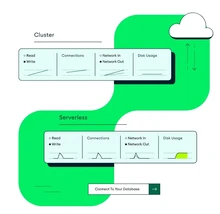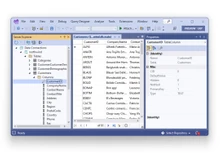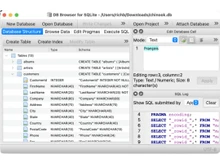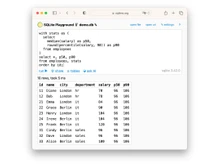Software development relies heavily on data management, and choosing the right database system is crucial for application performance, scalability, and efficiency. MongoDB and SQLite are two popular database options with specific use cases and requirements. Here, we aim to compare and analyze the benefits, and distinctive features of MongoDB and SQLite to help you make an informed decision.
SQLite and MongoDB are popular NoSQL databases but have different design principles and use cases. SQLite is a self-contained, file-based database that is ideal for small to medium-sized applications with simple data models. MongoDB, on the other hand, is a document-oriented database that is scalable and flexible, making it a good choice for large, complex applications with diverse data structures.
SQLite vs. MongoDB: An Overview
SQLite is a self-contained, file-based SQL database management system. It is a popular choice for developing applications that require managing a small database. SQLite can be easily integrated into a variety of applications, including web and mobile apps, and is known for its simplicity and ease of use.
MongoDB is a popular NoSQL database management system used for storing and managing large amounts of unstructured data. It is known for its scalability, high performance, and flexibility, making it a popular choice for big data and real-time web applications. MongoDB supports various data models, including documents, graphs, and arrays, and provides robust querying and indexing capabilities.
SQLite vs. MongoDB: Key Differences
Here are some distinguishing factors that make SQLite and MongoDB different from each other:
- MongoDB requires a MongoDB server, whereas SQLite is serverless.
- SQLite uses tables while MongoDB uses JSON documents as data formats.
- MongoDB handles very high transaction volumes, while SQLite is more suitable for low transaction volumes.
- SQLite uses a relational database model, while MongoDB uses a document-based model.
- MongoDB and a few other MongoDB alternatives support horizontal scalability, while SQLite has limited vertical scalability.
- SQLite is more portable since it stores its database in a single file.
- MongoDB has significant admin requirements, whereas SQLite requires minimal administration.
- SQLite is available on all Unix-based operating systems and Windows. MongoDB is compatible with Linux, Windows, and macOS.
- MongoDB requires more space due to its scalability features, while SQLite and other SQLite alternatives require minimal space.
- SQLite has widespread support in various programming languages, while MongoDB's support is not so extensive.
- MongoDB suits high data volume and low data complexity, while SQLite is suitable for low data volume and low data complexity.
SQLite vs. MongoDB: In Terms of Features
- Data Model: MongoDB excels at storing data in JSON-like documents, allowing flexible and dynamic data structures. It uses a flexible schema with JSON-like documents stored in collections and supports full object and array support. On the other hand, SQLite is based on the relational data model, using tables columns, rows, and structured schemas for data organization.
- Set-Up Strategies: MongoDB requires setting up and managing database servers, making it ideal for applications with client-server architectures. SQLite databases, on the other hand, are self-contained files, which simplify the deployment and make them portable across various platforms.
- Concurrency Management: MongoDB supports thousands of concurrent users. In contrast, SQLite also supports concurrent writing but requires developer interaction to leverage effectively. MongoDB has an inherent support for high concurrency, enabling multiple concurrent read operations. On the contrary, SQLite performs the best in low to moderate concurrency environments due to its single-user mode design.
- Data Structure Management: MongoDB is proficient in managing complex data relationships and hierarchical structures. SQLite, on the other hand, is better in applications with simple relational data requirements.
- Resource Management: MongoDB consumes more resources due to its server-based architecture and scalability demands. Whereas, SQLite is resource-efficient, which makes it suitable for environments with limited computational capabilities.
- Query System: MongoDB offers a rich and powerful query language and includes a MongoDB aggregation framework for advanced data analysis and transformations. On the other hand, SQLite supports most of the SQL standards but lacks certain powerful features like ALTER TABLE and JOIN operations.
SQLite vs. MongoDB: Scalability
MongoDB provides concurrency mechanisms and auto-scaling capabilities via MongoDB Atlas. Apart from that, it is designed for horizontal scalability, making it suitable for applications with exponential data growth and distributed data management. On the other hand, SQLite is designed for single-user architecture with limited scalability options. Therefore, it is limited by its single-file architecture and focuses on single-user or small-scale applications.
SQLite vs. MongoDB: Security
MongoDB provides built-in user-level permissions and authentication. Apart from that, it offers advanced authentication, TLS, and access listing and supports native encryption solutions. SQLite relies on OS-level file system permissions for access control and supports third-party encryption libraries.
SQLite vs. MongoDB: Platform Support
MongoDB provides native platform and programming language drivers, with comprehensive documentation and code examples. On the contrary, SQLite offers limited "official" pre-compiled binaries and SDKs and relies on third-party libraries for additional language support.
SQLite vs. MongoDB: Deployment
MongoDB can be deployed using MongoDB Atlas (cloud platform) or self-hosted via MongoDB Servers. SQLite, on the other hand, requires manual deployment or the use of third-party services.
SQLite vs. MongoDB: Use Cases
MongoDB is tailored for applications dealing with extensive, ever-changing, and unstructured data volumes. SQLite is an excellent choice for mobile applications, desktop software, and projects requiring localized data storage capabilities.
SQLite vs. MongoDB: Community
MongoDB has an active community and offers an extensive ecosystem of tools, libraries, drivers, and integrations. SQLite, on the other hand, has a streamlined ecosystem due to its lightweight nature, focusing on applications that require localized data storage.
Which Is Better, SQLite or MongoDB?
SQLite is a file-based database for small to medium-sized applications, while MongoDB is a scalable document-oriented database for large, complex applications. MongoDB requires a server, uses JSON documents, and handles high transaction volumes, while SQLite uses tables, has limited vertical scalability, and is more portable. MongoDB supports multiple data models and requires more space, while SQLite focuses on efficiency and reliability.
MongoDB excels in managing complex data relationships, offers powerful querying capabilities, and supports high concurrency. However, SQLite is resource-efficient and suitable for simple relational data requirements. MongoDB has built-in security features, extensive platform support, and can be deployed via MongoDB Atlas or self-hosted servers. While SQLite requires manual deployment and offers localized data storage capabilities.


 5 Ratings & 0 Reviews
5 Ratings & 0 Reviews





















